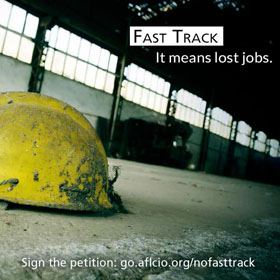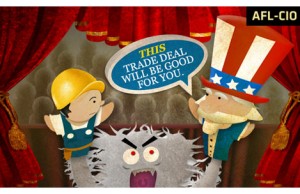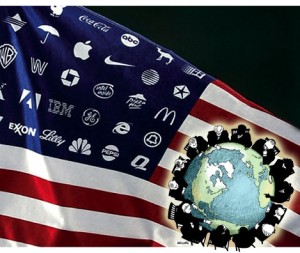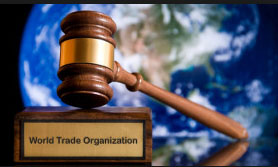OPINION
Let’s get off the hamster wheel on international trade
By CELESTE DRAKE
 In January 2014, AFL-CIO President Richard Trumka, responding to the introduction of the latest “Fast Track” legislation, said, “It is past time for the United States to get off the corporate hamster wheel on trade.”
In January 2014, AFL-CIO President Richard Trumka, responding to the introduction of the latest “Fast Track” legislation, said, “It is past time for the United States to get off the corporate hamster wheel on trade.”
On the issue of trade, investment, and global economic rules, America’s workers — and our brothers and sisters overseas — certainly are on a hamster wheel.
Every few years or so, whoever’s sitting in the White House decides that the thing a very smart president (VSP) would do is to pursue Fast Track and trade deals.
And so, that VSP starts negotiating, for instance, with Mexico and Canada (NAFTA), or with Central America (CAFTA), or a random groups of 11 other Pacific Rim countries (TPP). The VSP tells the American people that that the new trade deal will create jobs. That it will be “cost-free stimulus.” That it will “open foreign markets to U.S. exports.”
The VSP also tells Americas’ small businesses not worry about most of the benefits going to giant conglomerates. And America’s patients not to worry that drug prices will increase. And America’s parents that food and product safety won’t be diminished.
Then the VSP asks Congress for Fast Track trade negotiating authority, and mocks efforts to label Fast Track as undemocratic or to fix its numerous flaws.
Finally, the VSP says to America’s pundits “see how business-friendly I am?”
The problem with all of this is that in terms of trade policy, we really are on a hamster wheel. Don’t they define insanity as “doing the same thing over and over and expecting a different result”?
 Well that’s what we have been dealing for 20 years — very similar trade agreements, with very similar provisions — in many cases, copied word for word from the prior deal. Negotiated under very similar Fast Track rules. And each one fails to live up to its promises — to working families, to small businesses, to family farms, to communities.
Well that’s what we have been dealing for 20 years — very similar trade agreements, with very similar provisions — in many cases, copied word for word from the prior deal. Negotiated under very similar Fast Track rules. And each one fails to live up to its promises — to working families, to small businesses, to family farms, to communities.
Workers were promised new jobs under NAFTA, but saw nearly 700,000 disappear. We were promised new jobs under the Korea FTA, but saw 60,000 disappear. We were promised jobs when the U.S. gave China PNTR (so that China could enjoy the full benefits of WTO membership), but we have lost 2.7 million jobs to China since then. Workers simply do not trust such promises anymore.
But these failures are not really due to flaws in the deals — these deals are largely doing what they are designed to do: to strengthen corporate influence, to deregulate the economy, to undermine union bargaining power, and to push down wages.
Wait, what? NAFTA was designed to push down wages? Absolutely.
As Dean Baker wrote in the New York Times piece “NAFTA Lowered Wages, as It Was Supposed to Do”:
After all, one of the main purposes of the agreement [NAFTA] was to make U.S. firms feel confident that they could locate operations in Mexico without having to fear that their factories could be nationalized or that Mexico would impose restrictions on repatriating profits. This encouraged firms to take advantage of lower cost labor in Mexico, and many did.
As Baker hints, the “trade” agreements the U.S. has entered into since NAFTA have all been much more about international investment and global economic rulemaking than they have about lowering tariffs. [1] These agreements are detrimental to the American economy, and that is why the AFL-CIO works so hard to change them.
We often get asked, “Why do you oppose trade deals. Do you hate jobs or something?” I think this question is the trade policy equivalent of “When did you stop beating your wife?” There is in fact no right answer to the question because its premise all wrong.
The fact is, you can be for “trade” without being for an agreement that has rules rigged for the benefit of giant global companies. The rules of trade agreements matter, and rules that favor corporate power, promote deregulation, and constrict the space within with democracy may operate are detrimental to shared prosperity — and frankly, to the American Dream.
 So who’s really winning under the current rules? The largest transnational businesses, which have freed themselves from what Forbes Magazine calls the “nonsenses [that] might cross the synapses of the body politic.” You might think that when businesses increased their efficiency, some of those productivity gains would be passed along to workers and consumers in the form of lower cases and higher wages. But all too often, the largest corporations keep the lion’s share of the gain and pay them out in the form of CEO and management bonuses, shareholder dividends, and stock buybacks. There simply aren’t effective provisions in these deals to strengthen worker bargaining power or to ensure large scale consumer benefits. In fact, in a September Pew poll, only 25% of respondents in 44 countries agreed that trade reduces prices.
So who’s really winning under the current rules? The largest transnational businesses, which have freed themselves from what Forbes Magazine calls the “nonsenses [that] might cross the synapses of the body politic.” You might think that when businesses increased their efficiency, some of those productivity gains would be passed along to workers and consumers in the form of lower cases and higher wages. But all too often, the largest corporations keep the lion’s share of the gain and pay them out in the form of CEO and management bonuses, shareholder dividends, and stock buybacks. There simply aren’t effective provisions in these deals to strengthen worker bargaining power or to ensure large scale consumer benefits. In fact, in a September Pew poll, only 25% of respondents in 44 countries agreed that trade reduces prices.
Beyond prices and wages — consumer safety is another loser in these agreements. When trade flows increase but corresponding and proportional investments are not made in customs and border infrastructure, unsafe products can and are imported in mass quantities (e.g., tainted baby formula and pet food, toys that contain lead, and vegetables and fish carrying food-borne illnesses).
Moreover, when non-discriminatory rules of general application are limited by trade rules and challenged by trading partners or by foreign corporations in special corporate courts, consumer-protective laws and regulations can be withdrawn or chilled. The WTO has already ruled against a U.S. ban on clove cigarettes, against dolphin-safe tuna labels, and most recently, the U.S.’s country-of-origin-labeling (COOL labeling) regime for meat.
This is another big loss for working families — a consumer’s right to know where his or her meat is born, raised, and slaughtered has been turned into a “Right to Conceal” simply because slaughterhouses find the law burdensome. Meat packers would prefer not to keep track of which animals arrived from which source—and the WTO agrees, undermining our ability to make an informed decision about which meat to buy.
Let me provide an additional example: the National Retail Federation has asked the U.S. government, in the negotiations on the new Trade in Services Agreement (TISA) to “work to ease regulations that affect retailing, including size restrictions and hours of operation that, while not necessarily discriminatory, affect the ability of large-scale retailing to achieve operating efficiencies.” Wal-Mart went a step farther, looking to eliminate restrictions on the “geographic location” of stores—which seems to be a veiled reference to get around local zoning decisions.
None of this is what “trade” is supposed to be about. It is not what we think about when we think of the positive impacts of trade. There has to be a better way, right? Right.
So let’s say that we believe that there are enough untapped benefits of trade for workers that it is worth trying to capture them by changing the rules of trade. What next?
 The agreement has to have different rules — rules that do not put the interest in private profits ahead of the public good. Rules that, instead of being deregulatory in nature, work to give governments more tools to intervene in the economy to make it operate more fairly.
The agreement has to have different rules — rules that do not put the interest in private profits ahead of the public good. Rules that, instead of being deregulatory in nature, work to give governments more tools to intervene in the economy to make it operate more fairly.
A good place to start is to eliminate the rigged “corporate courts,” also known as investor-to-state dispute settlement or ISDS. Corporate courts are designed to allow foreign investors to skip all the domestic processes citizens or domestic businesses must use to fight laws and decisions they do not like, such as national courts, administrative procedures and municipal hearings. Instead, foreign investors bring claims directly to international arbitration panels. The panelists are not accountable to citizens even though they are empowered to award unlimited sums of taxpayer money in compensation.
The very existence of these corporate courts are an affront to democracy. Systems of justice should be public, democratic and available to all in a society on an equal basis. ISDS simply does not meet this standard. Foreign investors can use these corporate courts to challenge anything that affects their bottom line — from requirements that cigarettes be sold in plain packaging to increases in the minimum wage. This seriously constrains governments’ ability to respond to public needs and set priorities for the economy.
ISDS decisions cannot, by themselves, “overturn” the law, regulation or decision that was challenged, but when a government loses, it may have to pay a substantial penalty to the investor that brought the case, sometimes far beyond what the investor put into the country in the first place. Even if a country wins, the cost to defend the case can be very expensive—$8 million per case, on average. The potential risks are enormous. Just threatening to bring a case sometimes is enough to get a proposed law or regulation withdrawn: knowing that Occidental Petroleum won a $2.3 billion judgment against Ecuador, for example, could lead a lawmaker or regulator to think twice about proceeding with an action after an ISDS case has been threatened.
Ultimately, ISDS is about increasing corporate power over our economies and limiting the ability of governments to regulate corporate behavior. So it is emblematic of the problems that plague the rules that currently govern U.S. policy.
Getting rid of ISDS is a necessary, but not sufficient condition for improving U.S. trade policy. What else is needed?
Try a thought experiment: if you were starting from scratch, what kind of rules would you put in place to ensure that workers who put in a fair day’s work could earn a fair day’s pay? To ensure workplaces are safe? To ensure that parents can easily know what is in the food they feed their families? To ensure that lifesaving medicines are affordable and available to all?
In other words, the rules that you would put in place to create a just society won’t be too different than those you need to create just trade. And those rules do not look like anything that the U.S. currently has in place.
Of course, as it approaches the ideal, trade policy will be more expensive than it is now: it will require, for example, investments in education, public services, and physical infrastructure, both here and in developing countries. But that is what it takes to create a sustainable global economy. And that is what all workers and their families need.
Sometimes, you really do get what you pay for.
In short, all of this has happened before. And, like the humans and cylons in the Syfy series Battlestar Galactica, our task is to prevent it from ever happening again. Together, we can do that!
[1] It is fair to argue that in the negotiations for the World Trade Organization, which was the first truly global economic governance agreement, tariff reduction in fact played a very large role. In fact, the WTO tariff negotiations were so successful that tariffs are no longer considered the major barriers to market access. Now “behind the border barriers” (also known as domestic laws and regulations) are the primary target of trade negotiators.
 Celeste Drake is Trade and Globalization Policy Specialist for the AFL-CIO. She was a special guest speaker this morning at the Washington Fair Trade Coalition’s fundraising breakfast.
Celeste Drake is Trade and Globalization Policy Specialist for the AFL-CIO. She was a special guest speaker this morning at the Washington Fair Trade Coalition’s fundraising breakfast.





